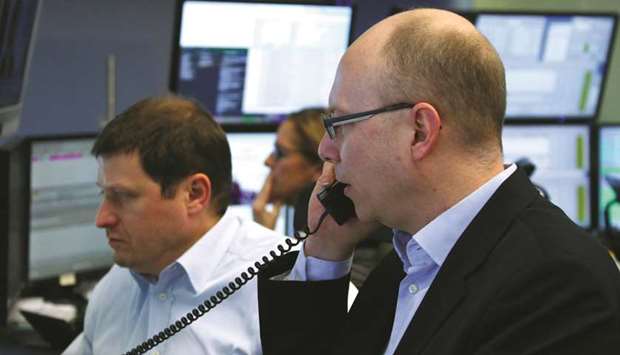Rising tensions between the United States and Iran dampened the mood in equity markets yesterday as investors turned to safe havens such as the yen, bonds and gold, with the latter striking a near six-year high.
Oil prices steadied despite the US imposing further sanctions on key crude producer Iran, with investors biding their time ahead of next week’s key Opec meeting on output.
Traders looked ahead also to crucial trade talks due this week between US President Donald Trump and Chinese counterpart Xi Jinping.
“Geopolitical tensions weighed on the (stock) markets yesterday after the US imposed new sanctions on Iran,” said Russ Mould, investment director at AJ Bell. “Investors (are) switching their attention once again to gold as a safe-haven asset.”
In Europe, London’s FTSE 100 was up 0.1% to 7,422.43 points, Frankfurt’s DAX 30 lost 0.4% to 12,228.44 and Paris’s CAC 40 was down 0.1% to 5,514.57 points at close yesterday.
The precious metal struck $1,442.90 an ounce, its highest level since September 2013, with a softer dollar lending additional support, according to traders.
Japan’s currency, viewed also as a haven investment, jumped to a near six-month high at 107.41 yen to the dollar.
Meanwhile the return on 10-year German government bonds – the European benchmark – hit a record low of -0.34% as investors were happy to pay more and more for the safety that comes with high-quality bonds.
Bitcoin held above $11,000 after breaking the marker on Monday for the first time in 16 months.
The latest round of US sanctions against Iran’s supreme leader Ayatollah Ali Khamenei and military top brass meant the “permanent closure of the path to diplomacy” with Washington, the Islamic republic’s foreign ministry said.
Trump unveiled the new restrictions on Monday, days after Iran shot down a US drone that Tehran said had entered its airspace.
Foreign ministry spokesman Abbas Mousavi’s tweet provided a catalyst to sell Asian shares yesterday.
On the trade front, Chinese state media said top-level US and Chinese negotiators had held more discussions and “exchanged opinions on economic and trade issues”.
The call took place “at the request of the US side” and they agreed to maintain contact, the Xinhua news agency said.
“The prolonged trade war between the two largest economies has downgraded global growth as more barriers to trade means higher prices,” said OANDA senior market analyst Alfonso Esparza.
“Optimism remains high, but more details need to emerge before the market can fully price in how far apart the two sides really are.”
Meanwhile, sterling weakened against the dollar after hitting its highest in a month yesterday as the risk of a no-deal Brexit stemming from the Conservative Party leadership contest weighed on the currency.
The pound has been supported to some extent by last week’s Bank of England meeting which sounded less dovish than other central banks; the dollar has lapsed to three-month lows against the euro and five-month lows versus the yen after the Federal Reserve encouraged expectations of a July interest rate cut.
But traders are increasingly concerned that the favourite to replace Prime Minister Theresa May – the eurosceptic Boris Johnson – will take Britain out of the European Union with no transitional trading agreements in place, a scenario many warn would hurt the economy
Johnson reiterated his stance, telling the BBC he was “serious” about leading Britain out of the EU on the October 31 deadline without a deal if the bloc refused his demands to negotiate a new exit agreement.
Sarah Hewin, chief Europe economist at Standard Chartered, said that while no-deal still was not the main scenario for markets, “having a front-runner who has clearly stated no-deal is an option, is a concern”.
“The market has become more alert to no-deal risk. If we go back a few months that risk had been almost eliminated but it has re-emerged,” Hewin added.
By 1543 GMT, the pound was down 0.16% at $1.2720, coming off a one-month high of $1.2784 while against the euro, it was 0.04% lower at 89.48 pence
The new Conservative party leader will be elected by the end of July, leaving only a few months for them to try to renegotiate a Brexit withdrawal agreement.
These concerns have prevented sterling from fully benefiting from the dovish stance of central banks almost everywhere else in the developed world.
Scotiabank analysts saw sterling capped “in the upper $1.27s” against the dollar, predicting it to lag a broader dollar decline.

Traders work at the Frankfurt Stock Exchange.
